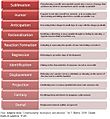Defense mechanism facts for kids
A defense mechanism is a special way your mind protects itself. It's like an automatic shield that helps you deal with tough feelings or situations. When something upsetting happens, your mind might unconsciously use these tricks. They help you avoid feeling too much stress, sadness, or worry. Without these mental tools, people might find it harder to cope with life's challenges.
Contents
What are Defense Mechanisms?
Defense mechanisms are techniques your unconscious mind uses. They help you handle difficult emotions or conflicts. Imagine your mind trying to keep you safe from emotional pain. That's what these mechanisms do. They can help you feel better when you are stressed or upset. Everyone uses them, often without even knowing it.
Different Kinds of Defense Mechanisms
There are many types of defense mechanisms. Each one works in a different way to protect your feelings. Here are some common ones:
Regression
Regression is when you act like a younger person. This happens when you are stressed or upset. For example, a teenager might start sucking their thumb again. Or they might throw a tantrum like a small child. It's a way to go back to a time when things felt simpler and safer.
Repression
Repression means pushing upsetting thoughts or memories deep into your unconscious mind. You don't forget them completely, but you stop thinking about them. This helps you avoid the pain they cause. For example, someone might not remember a bad experience from their childhood. Their mind has hidden it away.
Denial
Denial is when you refuse to believe something that is true. Even if there is clear evidence, you just won't accept it. For instance, a student might deny they failed a test, even after seeing their low score. It's a way to avoid a painful reality.
Reaction Formation
Reaction formation is when you act the opposite of how you really feel. If you have an unacceptable feeling, you show the opposite behavior. For example, someone who secretly dislikes a classmate might act overly friendly towards them. It hides their true feelings.
Projection
Projection means you see your own unwanted feelings or thoughts in someone else. Instead of admitting you feel a certain way, you believe someone else feels that way. For example, a person who is angry might accuse others of being angry at them. They are projecting their own anger.
Rationalization
Rationalization is making excuses for your behavior or feelings. You come up with logical-sounding reasons for something that might not be logical at all. For example, if you don't get invited to a party, you might say, "I didn't want to go anyway." This helps you feel better about the situation.
Displacement
Displacement is when you take out your feelings on someone or something else. You can't express your feelings to the real source, so you direct them elsewhere. For example, if you're angry at your teacher, you might go home and yell at your little brother. The anger is "displaced" onto someone safer.
Compensation
Compensation is when you try to make up for a weakness in one area by excelling in another. If you feel bad about one skill, you work hard to be great at something else. For example, a student who struggles with sports might become a brilliant musician. They compensate for their athletic weakness with musical strength.
Images for kids
See also
 In Spanish: Mecanismo de defensa para niños
In Spanish: Mecanismo de defensa para niños
 | Delilah Pierce |
 | Gordon Parks |
 | Augusta Savage |
 | Charles Ethan Porter |


